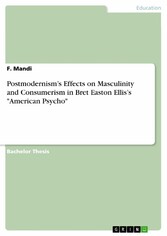Postmodernism's Effects on Masculinity and Consumerism in Bret Easton Ellis's 'American Psycho'
von: F. Mandi
GRIN Verlag , 2023
ISBN: 9783346846105
, 42 Seiten
Format: PDF
Kopierschutz: frei
Preis: 18,99 EUR
eBook anfordern 
Mehr zum Inhalt

Postmodernism's Effects on Masculinity and Consumerism in Bret Easton Ellis's 'American Psycho'
Bachelor Thesis from the year 2023 in the subject Didactics for the subject English - Literature, Works, grade: 1,3, University of Göttingen, language: English, abstract: The purpose of this paper is to analyze Patrick Bateman in 'American Psycho' as a symbol and personification of a particular kind of society that critics have called the postmodern era of late capitalism. Bret Easton Ellis portrays Patrick as an individual whose life focuses primarily on obsessive consumerism. The condition of postmodernity marks the production of countless commodities that lead to excessive consumerism. This aspect is eminent in Patrick Bateman's behavior which leads to his toxic masculine conduct and seriality of repetitiveness. I argue that the main character, Patrick Bateman, represents these aspects because of a society that focuses above all on outer appearance and status. The aspiration for this ideal causes people to treat themselves and others harmfully. That circumstance makes characters such as Patrick Bateman and others like him treat people as consumer goods while disregarding their feelings and values. 'American Psycho' represents this pattern by portraying Patrick Bateman as an ideal performer who endlessly consumes, which shapes his view on others and leads to the subsequent murders since everyone has no real identity and becomes, therefore, interchangeable. Under the economic conditions of postmodernity, where everything is a commodity, people treat other people like commodities and in the same way that products are disposable, people become throwaway as well. Hence, people, particularly women, turn into products for Patrick that he may repeatedly kill because he values having the most of everything; accumulating killing adds to his sense of status. He describes commodities in his environment in the same way he describes the narratives of his serial killings and other acts of violence. Patrick Bateman is merely a part of his environment, where everyone feels the urge to be more significant and superior to everyone else, which inevitably leads to the perpetuation of the same pattern.













